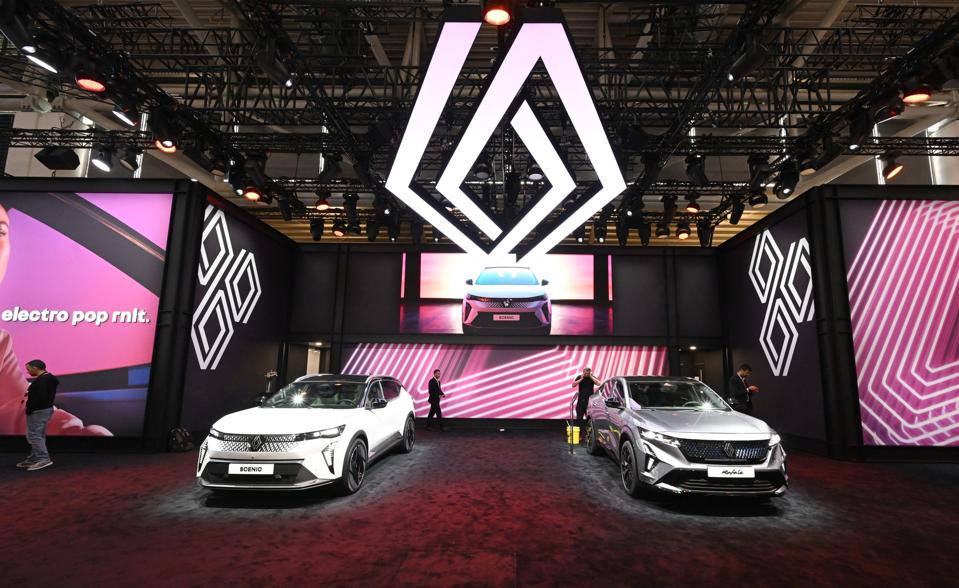Investors are happy Renault pulled its plan to sell shares in Ampere, its electric vehicle and software company, undermined by faltering EV prospects.
When the plan to launch an initial public offering in Ampere was unveiled last year, potential investors worried that it risked leaving Renault with a complex holding company structure, with shares that would require a discount to attract stock market investors.
Renault’s initial hopes that the market would value Ampere at between €8 billion ($8.7 billion) and €10 billion ($10.9 billion) looked over- ambitious. Analyst valuations were much lower, ranging from €7 billion ($7.6 billion) down to €4 billion ($4.4 billion).
Meanwhile, the sheen has come off the market for EVs as unsold vehicles pile up on dealers’ forecourts. Strong sales targets begin to look too high. Prices are falling and profit margins disappearing. Chinese companies like BYD and SAIC are gearing up a sales assault on Europe with their costs said to be least 30% less than Europeans.
More news on Tuesday underlined the fragility of the EV outlook when Bloomberg reported Volkswagen was hesitating with its plans for an IPO of its PowerCo battery subsidiary.
Berenberg Bank of Germany wasn’t surprised by the news from Renault, given the short-term downturn in EV prospects, but it was a negative for Renault’s perception among investors.
“Although this news could be taken as a negative for Renault as it will raise legitimate questions about its EV strategy/momentum, it should not come as complete surprise. This is due to the increasingly challenging EV market that has been well-flagged, with price and products competition remaining high, EV growth/demand momentum fading and broad-based uncertainties around subsidies and residual values not helping to fuel investor appetite for pure-play EV companies,” Berenberg Bank said in a research note.
“Shareholder feedback about the potential IPO of Ampere was generally negative, pointing to the likely dilution and uncertainties regarding valuation, value creation and value transfer between Ampere, the division’s cornerstone investors and Renault Group,” the bank said.
Berenberg Bank pointed out Renault still retained targets it announced last November, with six vehicle launches including the Scenic, R5, R4 and Twingo/Legend, free cash flow breakeven in 2025, and 10% margins by 2031.
Bernstein Research analyst Daniel Roeska never liked the idea of an Ampere flotation, but said the decision at least removed a negative for Renault’s outlook.
“While we expect the initial reaction to be positive, it will also make room for the market to take a closer look at Renault’s 2024 outlook, where we see headwinds emerging,” Roeska said.
Investment researcher Jefferies said the Ampere cancellation was “a most logical decision”, should be a positive for shareholders and removed a layer of complexity. The Ampere project of ring-fencing EV operations to drive down costs, remained in place. Funding was adequate.
“While current pure EV valuations made an IPO unattractive, reaching a low point in negative sentiment provides upside to Renault shares,” Jefferies said in a statement.
Renault, in which France has a 15% stake, has impressed investors with its moves to restore profitability, reform its alliance with Nissan, and live without its Russian subsidiary. Financial results for 2023 will be published on February 15.
Renault’s plans to bring to market a so-called “affordable” sub-$22,000 electric car, the Legend formerly known as the Twingo, may well reach the market at the same time China introduces its affordable EVs, which arguably could be priced closer to $15,000.
Ampere is charged with increasing annual sales to €10 billion ($10.9 billion) by 2025 and more than €25 billion ($27 billion) by 2031. It will break-even in the second-half of 2025, and sell 1 million vehicles by 2031, according to the plan.
EV sales in Europe are still expected to eventually accelerate and the current level of around 2 million a year is expected to hit around 9 million by 2030.

